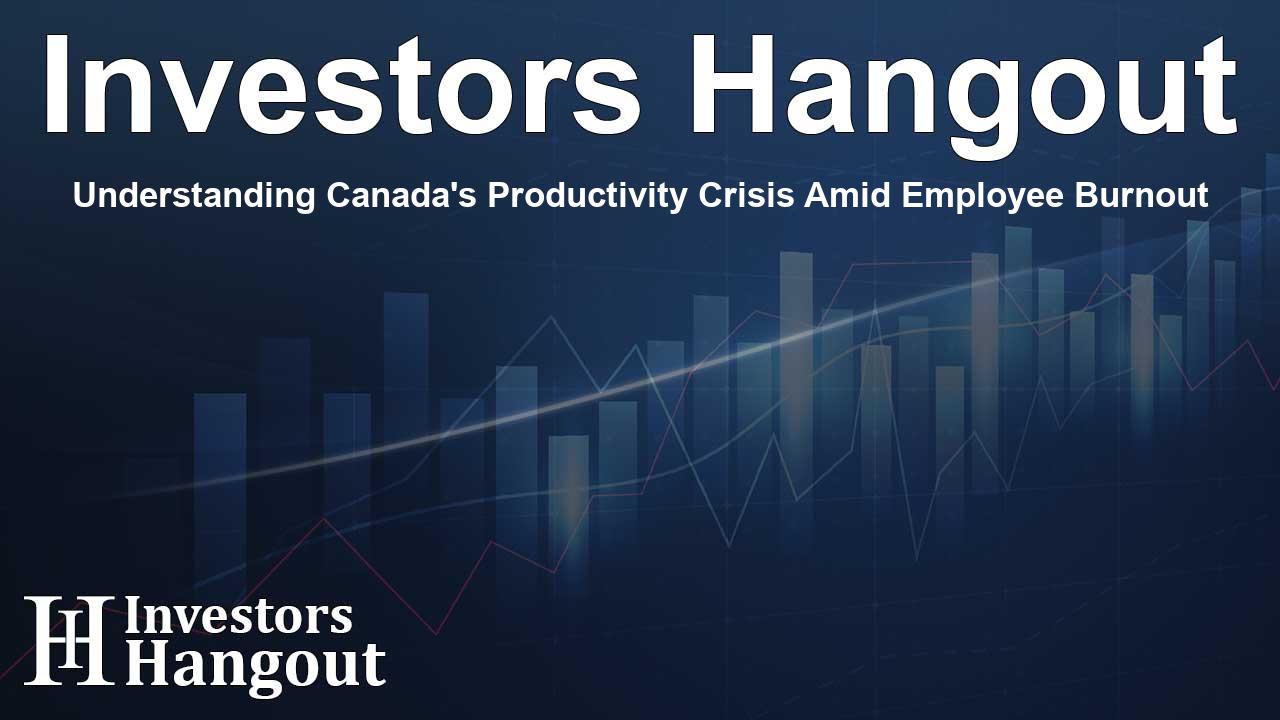Understanding Canada's Productivity Crisis Amid Employee Burnout

Canada Faces a Growing Productivity Challenge
Recent insights from the Healthcare of Ontario Pension Plan (HOOPP) in collaboration with Angus Reid Group reveal a pressing issue: employee burnout is becoming a critical concern for businesses across Canada. The findings highlight that as inflation impacts the economy, it also exacerbates workplace productivity challenges.
Effects of Inflation and Burnout on Businesses
The 2024 Canadian Employer Pension Survey surveyed over 750 employers and uncovered that inflation is currently viewed as the most detrimental factor impacting businesses. However, a close second in concern is employee burnout, which is being recognized as a significant barrier to productivity. Alarmingly, nearly 75% of employers concur that Canada is undergoing a productivity crisis, emphasizing the link between employee well-being and overall business efficiency.
Understanding Employee Productivity Declines
According to the survey, a staggering 85% of businesses experiencing declines in productivity cited employee burnout as a major issue. Even among those reporting satisfactory productivity levels, 64% acknowledged that burnout was still hindering performance. This chronic state of fatigue among employees not only affects individual well-being but also ripples through teamwork and project delivery timelines.
Employer Investment and Its Impact on Productivity
Interestingly, the research indicates a worrying trend: fewer companies are investing in employee benefits compared to previous years. It was reported that 22% of participating businesses did not invest in their workforce this past year, opting out of enhancements like compensation increases, healthcare improvements, or retirement benefits. In contrast, those employers who did invest saw marked improvements in productivity, with 42% of businesses that enhanced retirement offerings reporting better-than-average employee performance.
Investment in Employee Financial Futures
Demetre Eliopoulos, Senior Vice President of Research at Angus Reid Group, commented on the situation, stating, "Canadian businesses are witnessing how inflation and rising interest rates negatively affect both employee performance and overall productivity." This data underlines the essential perception that employers who proactively invest in their workers' financial futures, particularly through retirement savings plans, are better positioned to overcome productivity obstacles related to burnout.
The Shift in Employer Perspectives
This year's findings illustrate a distinct drawback in employers' future plans, with only 62% expressing intentions to invest in employee well-being in the upcoming year—a significant decline from 82% in 2023. Moreover, a mere 11% indicated plans to enhance retirement benefits, suggesting a disconnect between employer initiatives and employee needs.
Employee Sentiment Towards Retirement Benefits
Ivana Zanardo of HOOPP emphasized the discrepancy by noting, "Business leaders must heed their employees’ sentiments regarding the importance of retirement benefits." As organizations strive for sustained productivity, supporting employees through robust pension plans transforms from an optional perk to a necessary strategy for long-term success.
Confronting Financial and Mental Health Stressors
The survey results further reveal a pronounced concern linked to employees' mental healthcare and financial challenges. Close to 86% of employers recognize the importance of providing benefits aimed at alleviating employees' financial worries. Notably, 83% agree that retirement benefits effectively address these concerns, highlighting the need for transformative approaches to employee support.
Conclusion: Prioritizing Employee Well-Being
As Canadian businesses navigate these challenging economic conditions, the priority must shift towards enhancing employee support systems. With burnout posing a considerable risk to productivity, adopting an investment mentality in employee benefits is crucial. This includes focusing on mental health initiatives and improving financial health through retirement plans.
Frequently Asked Questions
What is the main finding of the HOOPP and Angus Reid Group research?
The research revealed that employee burnout is a significant concern for Canadian businesses, closely following inflation as a productivity barrier.
How does employee burnout impact productivity?
Burnout leads to decreased productivity levels, affecting individual and team performance, which hinders overall business efficiency.
What percentage of employers plan to invest in employees this year?
Only 62% of employers plan to invest in employee well-being this year, down from 82% last year.
Why are retirement benefits important for employees?
Retirement benefits help reduce financial stress among employees and support their long-term financial and mental health, contributing to better productivity.
How can businesses improve employee productivity?
Businesses can improve productivity by investing in employee well-being programs, enhancing retirement benefits, and addressing burnout directly.
About Investors Hangout
Investors Hangout is a leading online stock forum for financial discussion and learning, offering a wide range of free tools and resources. It draws in traders of all levels, who exchange market knowledge, investigate trading tactics, and keep an eye on industry developments in real time. Featuring financial articles, stock message boards, quotes, charts, company profiles, and live news updates. Through cooperative learning and a wealth of informational resources, it helps users from novices creating their first portfolios to experts honing their techniques. Join Investors Hangout today: https://investorshangout.com/
Disclaimer: The content of this article is solely for general informational purposes only; it does not represent legal, financial, or investment advice. Investors Hangout does not offer financial advice; the author is not a licensed financial advisor. Consult a qualified advisor before making any financial or investment decisions based on this article. The author's interpretation of publicly available data shapes the opinions presented here; as a result, they should not be taken as advice to purchase, sell, or hold any securities mentioned or any other investments. The author does not guarantee the accuracy, completeness, or timeliness of any material, providing it "as is." Information and market conditions may change; past performance is not indicative of future outcomes. If any of the material offered here is inaccurate, please contact us for corrections.